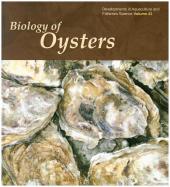 Neuerscheinungen 2017Stand: 2020-02-01 |
Schnellsuche
ISBN/Stichwort/Autor
|
Herderstraße 10
10625 Berlin
Tel.: 030 315 714 16
Fax 030 315 714 14
info@buchspektrum.de |

Brian L. Bayne
Biology of Oysters
2017. 860 S. 276 mm
Verlag/Jahr: ACADEMIC PRESS 2017
ISBN: 0-12-803472-6 (0128034726)
Neue ISBN: 978-0-12-803472-9 (9780128034729)
Preis und Lieferzeit: Bitte klicken
Biology of Oysters offers scientific insights into the structure and function of oysters. Written by an expert in the field of shellfish research, this book presents more than 50 years of empirical research literature. It provides an understanding of the edible oysters, in order to equip students and researchers with the background needed to undertake further investigations on this model marine invertebrate.
Presents empirical research findings in context with the relevant theory and its expression in computer models
Includes information on studies of other bivalve species such as mussels and clams
Offers a description of the whole organism to provide a frame of reference for further research
Includes research developments in the phylogeny, physiology and ecology of oysters
I: The Phylogeny of Oysters
II: The Evolution of Oysters
III: Regional and Global Ecology
IV: Ecology at the Local Scale
V: Feeding
VI: Metabolic Expenditure
VII: Growth
VIII: Growth Models
IX: Reproduction
X: Oysters and the Ecosystem
"It is stunning to read the level of intellectual depth, integration, and synthesis that Brian Bayne (yes, he is the sole author and wrote every word of this 844-page book!) has achieved in this impressive work. It is, truly, a magnum opus." --National Shellfisheries Association Quarterly Newsletter, No. 4
Bayne, Brian Leicester
Brian Bayne´s research has encompassed physiological ecology, comparative physiology and physiological energetics of marine bivalves, with an emphasis on mussels and oysters; his aim has been to understand how they make a living. He has made contributions to larval ecology, the responsive nature and flexibility of feeding behaviour, and the significance of genetic variability. During his career as a marine biologist he served as the Director of the Institute for Marine Environmental Research, the Plymouth Marine Laboratory and as the first Director of the UK Centre for Coastal and Marine Sciences. After retirement in the UK he held a Research Professorship at the University of Sydney. In 1998 he was elected to the Order of the British Empire for services to marine science.


